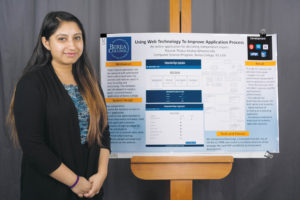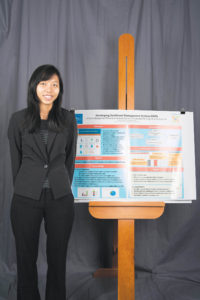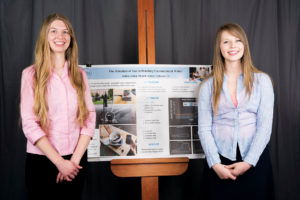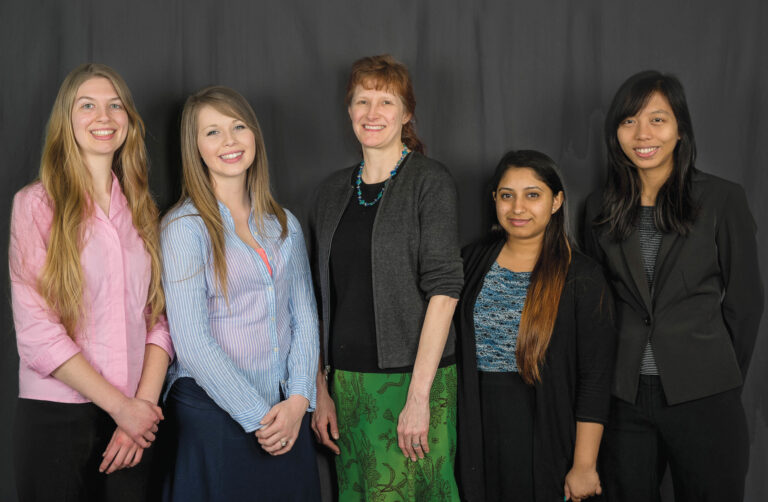“I’ll never use this in the real world.”
“If you want to succeed in a technical field, attend a research university.”
“Class projects are boring.”
Though such truisms have always been suspect, lately the computer science program at Berea College has been quite effective at shooting them down. Evidence for this came in February, when Dr. Jan Pearce took 22 students to the Tri-State Women in Computing Conference in Cincinnati, Ohio. They competed against more than 200 students from other schools, including the University of Kentucky and the University of Cincinnati.
While Pearce was confident the students would perform well, even she was a bit surprised when Berea swept the undergraduate awards.

Honorable mention (third place) went to Raunak Shona Thakur ’18 for her project, “Using Web Technologies to Improve Application Process.” Thakur said her work developed from a service-learning class assignment to choose a real-world problem and solve it using technology. In the class, taught by Dr. Mario Nakazawa, she developed an online system for declaring an independent major, which makes the process more efficient and helps reduce the waste associated with a paper-based process.

Phyo Phyo Kyaw Zin ’16 took second place for her project, “Developing Dashboard Management System (DMS),” which she developed for Joan Pauly, sustainability coordinator, with the direction of Dr. Scott Heggen. According to Zin, the dashboard is “an integrated platform for managing and displaying sustainability data. The back-end data is all stored in Google Drive spreadsheets and the front-end is displayed on a WordPress platform.” The integration means as soon as data is updated on the spreadsheet, the information displayed on the sustainability website changes. The dashboard can be accessed at www.berea.edu/sustainability/sustainability-dashboard.
The winning project was a team effort by Ashley Aiken ’18 and Amber Tolleson ’16. Working with Dr. Matt Jadud, Aiken and Tolleson programmed a sensor to detect the kinds of gases produced by fracking. Fracking is a controversial technique for extracting natural gas or oil from the ground by injecting pressurized liquids. The gases released through this process are believed by many to be harmful to the environment.
“We wrote code that told the sensors to take five readings per second and average them. The code was then sent via Bluetooth dongle to a phone, which stored the data that we later examined in Excel,” Aiken said. For the project to succeed, they had to find a way to deploy the sensor in the field. Tolleson noted that while it required “many, many designs and hardware store trips,” the team enjoyed the process of “learning how to use a variety of tools for building.”

What makes the success of these women even more remarkable is that none of them came to Berea with strong backgrounds in computer science. Thakur said computer science simply was not “part of curriculum in schools in Nepal.”
“Computer science is definitely a new interest,” said Aiken. “I did not have a computer until I was a senior in high school, so I never dreamed that I would be majoring in computer science.”
While much of the credit for the successes at the conference goes to the students and faculty, Pearce believes the educational model of the college as a whole also plays a role.
“A Berea education helps students to think critically and to communicate effectively, both of which are valuable skills that I believe give Berea students an advantage that they often do not fully appreciate until after graduation,” said Pearce. She also credits the Labor Program with developing a strong work ethic that “empowers Berea students,” giving them the confidence to tackle real problems in the workplace or any other area of life.
The faculty hope these successes will help the program to continue to grow and attract student interest, especially among female students, since women are significantly underrepresented in the field. This year, Berea will graduate 20 computer and information science (CIS) majors, including seven women. While women represent only 35 percent of Berea’s CIS majors this year, that percentage is nearly double the national rate (18 percent) of female graduates in CIS at the bachelor’s level. In a few more years, maybe the idea that “technology appeals more to boys” will be another truism turned anachronism.


